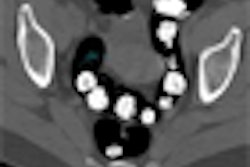
NEW YORK (Reuters Health), Jul 17 - B-mode ultrasonography is a simple, noninvasive way to assess carotid distension, which is an independent predictor of coronary heart disease (CHD) in the elderly, French researchers report in the July issue of Arteriosclerosis, Thrombosis, and Vascular Biology.
Arterial mechanical properties appear to be intrinsically involved with coronary artery health. To assess the predictive value of carotid wall mechanics for CHD, Dr. Nathalie Leone of the Faculte de Medecine Xavier Bichat in Paris and colleagues in the Three-City Study (Bordeaux, Dijon, and Montpellier) performed carotid B-mode ultrasonography in 3,337 individuals age 65 years and older.
B-mode ultrasound of carotid arteries is a valid and reproducible method of assessing carotid distension, Dr. Leone commented in an interview with Reuters Health. "It could be used as a supplement to the assessment of major traditional risk factors, such as tobacco consumption, hypertension, dyslipidemia, and diabetes mellitus to identify high-risk individuals in clinical practice," she added.
Median follow-up was 43.4 months, during which there were 128 CHD events.
The team found that carotid distension, or the relative stroke change in lumen diameter, was "significantly associated" with CHD risk. Patients in tertile 3 had a hazard ratio for CHD of 1.80 compared with those in tertile 1.
Age, heart rate, brachial or carotid pulse pressure, and common carotid intima-media thickness did not affect the association between carotid distension and coronary events. However, carotid artery intima-media thickness was associated with carotid artery distension.
While atherosclerosis was linked to carotid distension, it was not an independent risk factor for coronary events.
Dr. Leone postulated that "the positive association we observed between coronary events and carotid distension but not stiffness indices might be partly explained by local pulse pressure."
Whether local blood pressure is a cause or a consequence of carotid distension is unclear, she added.
As for any therapeutic implications, Dr. Leone said: "Our study is an epidemiological study and not an intervention study. So, these findings alone do not permit us to recommend or not recommend any treatment."
Beta-blocker therapy may not be advisable in these patients, she and her colleagues caution. They note that "by decreasing heart rate, beta-blocking agents may enhance the magnitude of arterial distension."
Beta-blockade reduces brachial blood pressure in patients with hypertension, "but does not act significantly on arterial wall structure and does not lower central systolic blood pressure as much as treatment with angiotensin-converting enzyme inhibitors or calcium antagonists," they add.
By Martha Kerr
Arterioscler Thromb Vasc Biol 2008;28:1392-1397.
Last Updated: 2008-07-17 11:18:10 -0400 (Reuters Health)
Related Reading
Coronary artery calcium better predictor than carotid IMT of cardiovascular events, July 9, 2008
Copyright © 2008 Reuters Limited. All rights reserved. Republication or redistribution of Reuters content, including by framing or similar means, is expressly prohibited without the prior written consent of Reuters. Reuters shall not be liable for any errors or delays in the content, or for any actions taken in reliance thereon. Reuters and the Reuters sphere logo are registered trademarks and trademarks of the Reuters group of companies around the world.


















